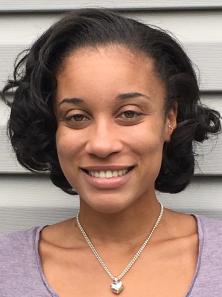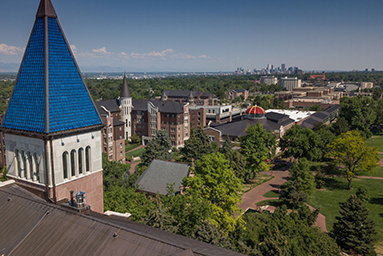Alyssa Dugger (MA ’19) — A Voice for the Vulnerable
In a field where patience, resilience, and humanity are critical, Alyssa Dugger (MA ’19) stands out as a powerful advocate for those often overlooked. As a mental health supervisor within a residential treatment program at Centennial Correctional Facility, she provides clinical guidance to a team serving approximately 250 incarcerated individuals with severe mental illness.
Her clients come from across Colorado’s correctional system and represent a wide spectrum of diagnoses—personality disorders, psychotic spectrum disorders, and behavioral challenges that make them difficult to place elsewhere. “We work with individuals that other facilities often decline to accept,” Alyssa explained. “Our program is built to stabilize those with severe mental illness—and that takes a very specific kind of patience and structure.”
Alyssa’s path into forensic psychology was driven by her commitment to support underserved communities. “I always wanted to help people who were less fortunate, who needed a voice,” she shared. Her early work in child welfare, juvenile detention centers, and with children on the autism spectrum helped her build the foundational skills she still leans on—patience, creativity, and structure.
While working at Devereux Advanced Behavioral Health, one of the nation’s largest nonprofit behavioral health organizations, she saw firsthand how individualized, person-centered care could make a difference. “There’s never a one-size-fits-all,” she said. “You have to pay attention to detail and get creative.” These lessons now inform her approach in corrections, where many clients haven’t experienced the support or structure they need.
April is Autism Acceptance Month, a theme that resonates personally and professionally with Alyssa. “Awareness is understanding what autism is. Acceptance is about incorporating someone with autism into your world without making them feel different.” In her current role, she’s seen how individuals with autism adapt to survive in prison—often masking their needs unless someone takes the time to truly see them.
Her time at GSPP was transformational. “I still have the voicemail from Lavita when she called to let me know I got in,” she recalled fondly. Despite initial self-doubt, Alyssa thrived. The supportive, intellectually rich environment gave her both the skills and confidence she needed.
One of the most formative experiences came in Dr. Lynett Henderson Metzger’s sociocultural issues class, a course she still refers to as “iconic.” “I was probably one of her biggest fans,” Alyssa said. “From the start, when we had to memorize the DSM, I thought it was cool. She broke it down so well that I could understand it and retain it. I knew where to look if I didn’t know something, and I wasn’t flustered by the book anymore.”
The impact went far beyond diagnosis. “We may not have all been friends, but it really helped us have a different level of respect for each other… [Lynett] was able to create a safe space for us to be able to share our stories and to be able to process—that’s something that I bring into my clinical role, creating a safe space.”
“You can’t expect people to open up—or change—without safety,” she said. “If you want someone to trust you enough to tell you the truth, you have to create space where they feel seen, not judged.”
At Addiction Research and Treatment Services (ARTS), Alyssa confronted the stigma around substance use head-on. “A lot of my clients thought they’d never get off methadone. That it was just swapping one drug for another,” she explained. “No one really talks about the people who successfully taper off or recover. Clients only see the negative stories, and that discourages them from trying.” She helps them see another path: “This doesn’t have to be a forever thing.”
In correctional settings, those misconceptions are magnified by a culture of pessimism. “Some of these people have been like this for 20, 50 years—you’re not going to just change it overnight,” she said. “It’s a process. They may relapse a bunch of times… but we have to work with them where they’re at versus just prejudging them.”
She recalls one client—a woman who had maintained sobriety for years before relapsing after a personal loss. “She was so ashamed. She thought I’d be disappointed in her,” Alyssa said. “Treating them more with respect and realizing they’re human... You used.. Okay. I know that was really hard for you. What are we doing now? How can we move forward?”
As we mark Alcohol Awareness Month, Alyssa emphasizes an often overlooked truth: “If people could just stop using drugs, I'm sure they probably would. If it was that easy, we wouldn't have this issue. It’s about being supportive of their journey.”
Her systems-level perspective reinforces the urgency of long-term, well-funded community care. “We need better transitions from prison to community care,” she emphasized. “The community mental health system often isn’t equipped to manage major mental illness at the level we see inside. We need more intensive, better-funded programs—ones that train clinicians well and support people long-term.”
For Alyssa, a master’s degree has opened meaningful opportunities to lead and make change. “You don’t need a doctorate to have a meaningful impact,” she said. “We need all hands on deck—therapists, social workers, psychologists. It’s about passion and purpose, not just credentials.”
As GSPP celebrates its 50th anniversary, Alyssa’s journey captures the essence of its mission. “This program helped me understand myself, my past, and how to connect with others,” she said. “It gave me the tools not just to help others, but to grow into someone who could lead.”
Balancing the demands of her role and motherhood, she’s learned the value of boundaries. “I decompress during my commute, I try not to bring work home, and I remind myself that I’m not getting paid after hours,” she laughed. “And now with my kid, I try to enjoy the little moments.”
To those considering careers in high-intensity settings like corrections, her advice is simple: “Ask questions. Talk to people who’ve been there. Give yourself grace. And don’t go in blind.”
Alyssa Dugger’s story is one of purpose, persistence, and heart—a reflection of the best of GSPP and a beacon for the next generation of change-makers in psychology.



